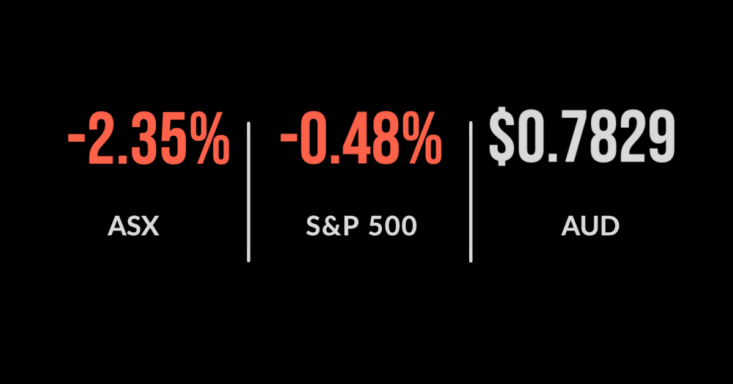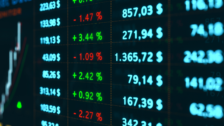Global markets drop, ASX200 down most in five months
Global markets drop, ASX200 down most in five months, Orica (ASX:ORI) and Afterpay (ASX:APT) smashed
The ASX200 (ASX:XJO) fell 2.4% on Friday, the worst daily fall in five months, taking the weekly performance down 1.8% but still managed to deliver a 1% return for February.
On Friday it was all about tech or anything that has benefitted from record low interest rates. The IT sector fell 5.3% on Friday alone, with Afterpay (ASX:APT) down 11.0% for the session.
Over the week, the mining sector remained the highlight, adding 1.7% and energy 1.6%, with the economic recovery play clearly in favour.
AMP (ASX:AMP) was a rare highlight, jumping 7.5% after announcing a deal to sell 60% of AMP Capital to Ares Capital for $1.35 billion.
It seems a strange deal for a company facing pressure in most of its other business lines, hence why the share price remains stuck around $1.50.
Orica (ASX:ORI) was the biggest underperformer, dropping 18.1% after flagging a potential $100 million hit to revenue and confirming CEO Alberto Calderon had stepped down.
This makes the second ‘mining services’ provider after Worley Parson (ASX:WOW) struggling to deliver despite a booming commodity sector.
Long seen as a low-risk way to access the commodity cycle, this is clearly no longer the case with mining activity falling between $70 and $80 million.
Kogan (ASX:KGN) hits 3 million users, Nuix (ASX:NXL) tanks
Kogan Ltd (ASX:KGN) closed out earnings season with another strong result, announcing a record dividend, up 113% to 16 cents per share.
The company saw sales increase 97% and revenue up 89% to $414 million after what the CEO confirmed was a record Black Friday sale.
Importantly, profit increased 164% to $23.6 million, meaning the companies scale may finally be delivering for investors.
IPO darling Nuix (ASX:NXL) moved back towards its IPO price, falling 32.4% on Friday after reporting a 3.9% fall in sales.
US markets continue to suffer, but finish the month higher
US markets had a mixed finish to the week, with the Nasdaq recovering 0.6% but the Dow Jones continuing to sink, down 1.5% behind a weaker energy sector.
The pain was real over the week as trades switched from ‘safe’ tech stocks back into more cyclical opportunities, with theNasdaq down 5% over the five days and the S&P 500 half that, down 2.4%.
Despite the difficult finish to the week, all three benchmarks finished February higher, led by the more ‘value’ oriented Dow Jones, up 3.2%, S&P500 2.6%, and the Nasdaq just 0.9%.
Airbnb (NASDAQ:ABNB) offered a rare highlight, jumping 13% after announcing a 22% fall in revenue to US$859 million, which was well ahead of expectations.
Over to you…central banks, four is the new six, equities are never defensive
I have been flagging the threat of higher bond rates throughout 2020 and in fact for many years, potentially somewhat early.
But markets are clearly now paying attention, with the US sell-off ultimately driven by valuation concerns after the 10-year US government bond yield hit 1.5% and showed few signs of slowing down.
In the 14 years since the Global Financial Crisis, every sell-off or bout of volatility has been countered by another round of monetary support, the big question is what reserves can central banks call on now?
It has never been more important to be selective in portfolios, with clear signs of overvaluation within major indices.
The story of reporting season sounds the same as years past but is likely very different; dividends. It has been a reporting season of record dividends, but not from the traditional sources, rather it has been mid cap, faster growing, e-commerce, and digitally enabled companies delivering the dividend surprises, rather than the banks.
After many years of expecting 6% plus dividends from ‘blue chip’ Australian shares, it is clear the future is far lower, with 4% the new 6% and investors required to truly understand each company they own.
The concept of ‘defensive’ companies has been an increasingly common statement by the many fund managers we have met in recent months, which in my view would suggest some complacency is creeping in.
The very nature of sharemarkets is that they are and will always be volatile, with valuations able to be excessive and to remain so for an extended period of time.










